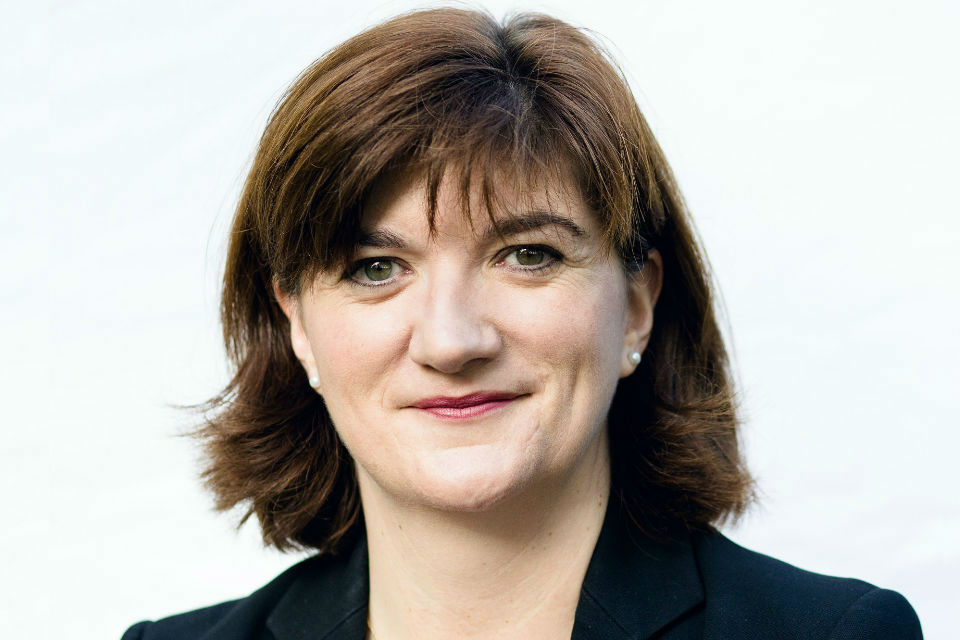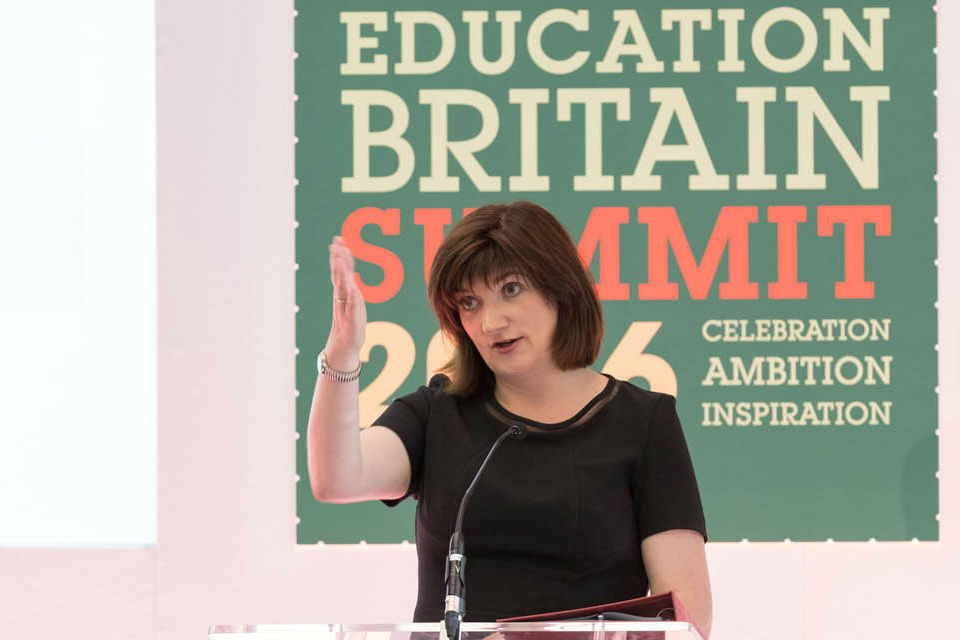Nicky Morgan: celebration, ambition and inspiration
The Education Secretary addresses the Education Britain Summit.

It’s a pleasure to be here at the Education Britain Summit today. Thank you to the Education Foundation for organising the summit with its positive focus on ‘celebration, ambition and inspiration’. These are, without doubt, challenging times but in a time of uncertainty the positive ‘can do’ approach of the Education Foundation is exactly what we all need.
When I accepted the invitation to speak at this event I knew that I’d be standing before you in a post-referendum world. The result is not the one I wanted or campaigned for and we are now living in uncertain times. I know, for many young people, recent events have been unsettling. We all - teachers, leaders, schools and parents - have an important role to play in providing reassurance and support to young people. I want to send a clear message today that:
- no child should live in fear of racism or bullying
- we will not stand for intolerance
- hate crimes of any kind must be stamped out
Long before this result, the government gave clear direction to schools to teach children and young people about the fundamental British values of democracy, the rule of law, individual liberty, and mutual respect and tolerance of those of different faiths and beliefs.
This is part of our drive to foster better social cohesion and encourage all young people to celebrate their differences alongside their unifying sense of Britishness.
Although the referendum result has changed so much about the world we are living in, my ambition remains resolute: to extend opportunity and deliver real social justice for all. Brexit doesn’t change that. We will continue with the ambitious pace of reform that we have begun. Now, more than ever, we owe it to the next generation to equip them with the skills, knowledge and confidence to take on the challenges they will face.
Celebration
Having spoken to the team behind today’s summit, I’m struck by their desire to build an ‘Education Nation’ - reforming of our system to meet the challenges of the future, but never forgetting to celebrate the things that are already being done well - rediscovering ‘national education treasures’.
So in that spirit I’d like to ‘celebrate’ the efforts of everyone here today. Your desire for a conversation and to work together is why I’m here and I’m really looking forward to you sharing your insights and expertise with me.
And as we approach the end of another school year we should also celebrate the efforts of teachers and leaders in schools throughout the country. Their hard work, commitment and exceptional ability to bring about excellent educational outcomes for young people represent our ‘educational treasures’. It’s thanks to their collective efforts that 1.4 million more children and young people are being taught in ‘good’ or ‘outstanding’ schools since 2010.
Ambition
I am ambitious for the education system, and that ambition is clear: educational excellence everywhere. Our white paper builds on the reforms that started in 2010 which focused on making sure that every child gets the best start in life.
Yesterday, schools received the first set of key stage 2 results, following the introduction of a far more rigorous curriculum in 2014. As a government we made the decision to raise the bar on literacy and numeracy. Because while the old arrangements allowed politicians to celebrate ever improving results, the truth is, expectations were too low.
We had to bring our primary school curriculum in line with the best in the world, because nothing is more important than ensuring that young people master the basics of reading, writing and mathematics early on.
If they don’t, they’ll be left playing catch up for the rest of their lives. That’s why as part of this government’s commitment to delivering real social justice, started by Michael Gove my predecessor, we have raised the bar on what counts as a good enough standard in the 3Rs by the end of primary school.

I want to thank all those involved in the tests this year, including teachers and parents, for supporting pupils through the transition to a more rigorous system. It’s important that all involved see these results for what they are - a reflection of how well children this year have performed against a new curriculum.
Whilst it is right that we should celebrate success and achievement, there is more we have to do. It cannot be right that in 2016 children’s educational outcomes are, in part, determined by where they live.
That’s why as a society we must share a common goal: to ensure that all children have an excellent education. We all have a part to play in achieving that goal. Everyone has a role to play. Central to that ambition are schools, their leaders and teachers, and that’s why the white paper has such a strong emphasis on ‘great teachers’ and ‘great leaders’.
There can be no doubt that high-quality teaching is essential to improving pupil outcomes. Excellent leadership is also key. Ofsted evidence has shown that the overall performance of a school rarely exceeds the quality of its leadership and management. That’s why getting great teachers and leaders where they are most needed is my absolute priority.
These are challenging times for some schools to get the teachers and leaders they need in order to drive up standards. I recognise that schools find it frustrating if they can’t secure the talent they rightly expect, and we are responding. An economy in growth presents challenges - in a competitive graduate market, the best graduates are in high demand.
I’m very clear about the role the government has to play, to create an environment in which schools can be ambitious. We’re tackling workload, encouraging recruitment to teaching and promoting higher standards.
And we’re making progress.
I’m delighted with the latest recruitment figures to teaching - we’re seeing growth in the number of people training to be teachers across a range of secondary subjects.
I can also confirm that our reform of QTS will be implemented no earlier than September 2018 - with a formal consultation about our proposals in due course.
We’re tackling workload so teachers and school leaders will have time to focus on what really matters - focusing on high-quality teaching and delivering excellent educational outcomes.
We recently published the reports of 3 independent review groups looking at tackling workload related to marking, planning and data management. These reports are a great example of the profession taking charge of their own development and they include clear messages that can empower teachers and school leaders. We urge everybody in education to consider and engage with the messages and recommendations in the reports.
We’re also focusing on reforms that support children to reach their full potential, like character education and mental health reforms. Equipping schools with the tools to make a real difference to the future success of their students.
As I said in my opening remarks, in a time of uncertainty, it’s more important than ever that we equip the next generation with the confidence to succeed. Character plays a huge role in that, as I have been told time and time again by experts in character education like Carol Dweck and Angela Drummond, who say that children need and deserve opportunities to learn:
- how to persevere and respect each other
- how to bounce back when faced with failure
- how to collaborate and build strong relationships at work and in their private lives
That’s why we are investing £6 million to test approaches to character education. We’re also delivering Character Awards to highlight the excellent practice that already exists at schools like Archibald Primary, where character education is at the heart of the school’s ethos and embedded across the curriculum. The school’s motto is “Believe and achieve” and the staff place great emphasis on instilling a belief in pupils that, whatever challenges they face, they can achieve their full potential.
And the Chancellor has announced that we will invest over £500 million so up to 25% of secondary schools can extend their school day to provide a wider range of activities, including those associated with building character.
These broader qualities are sought by parents, educators and employers alike.
Last year I supported the creation of the Careers & Enterprise Company - so that young people and employers can connect much earlier and start having the right conversations about career options and expectations - letting them know which skills and qualifications they need in order to advance their careers. The Careers & Enterprise Company is already doing great things under a fantastic CEO, Claudia Harris, and I know it will go from strength to strength. I would encourage anyone in business, with the capacity to get involved, to do so and start inspiring young people to succeed.
Employers want young people to have access to the right routes through education, to complement their individual strengths, and so that the economy gains the types of skills it really needs. That’s why the government is publishing its Skills Plan later this week - a strategy to lift the status of the technical route and put employers in the driving seat as the people best placed to know what skills our country needs.
Inspiration
The truth is that the government cannot and should not do it alone. We have a role to play but we need to be clear about the roles we need others to play. I hope that if we approach it as conversation rather than confrontation we’ll make the progress we need.
Many of our key policy interventions have been based on advice from leading heads and teachers, and we welcome their input and wise counsel. We will continue with that approach so that reforms are owned by the educators. But we should be clear that schools and their leaders must step up and play their part.
We’ve been very clear about the role schools need to play in identifying and developing talented teachers:
- getting involved in ITT
- creating a working environment that provides opportunities and reward for teachers and leaders
- developing and training the next generation of leaders
The government has created opportunities - schools need to make the most of them. Many already are.
That’s why I want to inspire, empower and extend the reach of our best leaders, putting them at the heart of the education system where they can drive change and take ownership of the system. If we are to achieve our ambition for educational excellence everywhere, then a supply of high-quality leaders is needed at all levels, from middle and senior leaders to headteachers and system leaders and increasingly at MAT CEOs level.
We believe that schools are best placed to recognise teachers with the talent, ambition and commitment to become leaders. To support this, we want to ensure schools and prospective leaders themselves can identify and choose to access high-quality leadership development opportunities.
And I’m very proud of the creation of a ‘Women in Education’ network to further support women’s career progression. We’ll be working with organisations such as ASCL and #WomenEd and with schools to ensure that this provision does not duplicate existing support. We are creating the “leadership coaching pledge”. Our ambition is to have 1,000 pledges so that 1,000 women are supported through coaching by system leaders by March 2017.
Thank you
I’m clear that society as a whole - not just government and schools - has a shared responsibility to celebrate the dedication of everyone involved in education, and to recognise the essential contribution they make.
Thank you for all your hard work in pursuing educational excellence everywhere and the collaborative approach you are taking to achieving it.
Image credit: Paul Clark/The Education Foundation